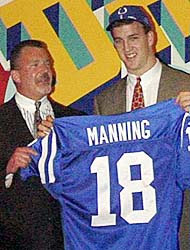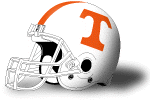

 |
 |
 |
|
INDIANAPOLIS (August 12, 1998) -- The Indianapolis Colts are coming off a dismal season, one in which they recorded a league-worst 3-13 record, and yet the ticket base this year is one of the team's strongest of the decade.
That's a switch for the city's increasingly picky fans. The additions to the team -- including a $48 million quarterback -- must be helping. Greg Hylton, the Colts' director of ticket sales, expects the team's season-ticket base to hit 40,000. At midweek, it was between 38,000 and 39,000. Whatever the final total, it will be an increase over last year (36,500) and represent the highest base since 1991 (42,000). The team is confident that whatever damage was done by last year's thrashing has been compensated for with the arrival of new leadership -- president Bill Polian and coach Jim Mora -- and the acquisition of quarterback Peyton Manning, the first overall pick in the draft. Of last year's 36,500 season ticket holders, 90 percent renewed their orders. Another positive indicator is the popularity of mini-season ticket packages. In 1997, the team offered five-game packages for the first time and sold 1,500. This year, a three-game package was added. To date, roughly 2,600 five-game sets and 1,200 three-game packages have been sold. "We're up all across the board," Hylton said. The post-draft hype involving Manning hasn't pushed sales through the Dome's teflon ceiling, but the Colts are banking heavily on the public's curiosity about a phenom quarterback and a young team with new direction. "But we're trying to be realistic," said Hylton. "We're still coming off a 3-13 season and ... we know we've got to take baby steps. The idea is to get our base up to 40,000 this year, then increase it by 2,000 or 3,000 next year. "As the team gets better, we'll get better." The importance of a substantial season-ticket base is undeniable in terms of game-day attendance. The higher the base, the less hawking ticket personnel must do on a week-to-week basis. And walk-up ticket sales generally are guided by the team's won-loss record, the opponent and the time of year. In 1995, the season-ticket base was 33,700. But the Colts' dramatic drive to the AFC title game created enough in-season interest to produce an average per-game ticket distribution of 56,607. Last year's low base contributed to the Colts ranking 24th in average attendance (56,432). In terms of filling the RCA Dome, the team issued tickets for 93 percent of the 60,567 seats -- 17th in the NFL. The team declined to elaborate on ticket sales for this year's eight home games, other than to indicate the Sept. 6 regular-season opener with Miami is a virtual lock to be a sellout. The game will feature Manning in his NFL regular-season debut against Dan Marino, the Dolphins' record-setting quarterback. "Our goal for the regular season is to sell out every game," said Ray Compton, the Colts' executive director of business development. The Colts sold out three games last season, which goes to show how things have changed since the team arrived in 1984. Back then, all the team's ticket personnel had to do was answer the phone. The novelty of being in the NFL was enough to convince local fans to invest in season tickets. The team averaged a season-ticket base of 55,600 from 1984-86 despite winning just 12 of 48 games. But the novelty wore off and the fans became more particular. Following the team's 1-15 record in 1991, the season-ticket base plummeted from 42,000 to 36,000. And an offshoot of the Colts' 4-12 finish in '93 was an all-time low base of 33,700. In 1998, the Colts increased their ticket sales staff to include five individuals who pound the pavement full-time and four more who primarily work out of the office. And they have increased their marketing efforts. Thirty billboards featuring the Colts will dot the city over the next two weeks. 2 "We know we've got a lot of work to do in terms of increasing interest in the Colts and ... we are doing a lot of creative things to get it done," Compton said. |